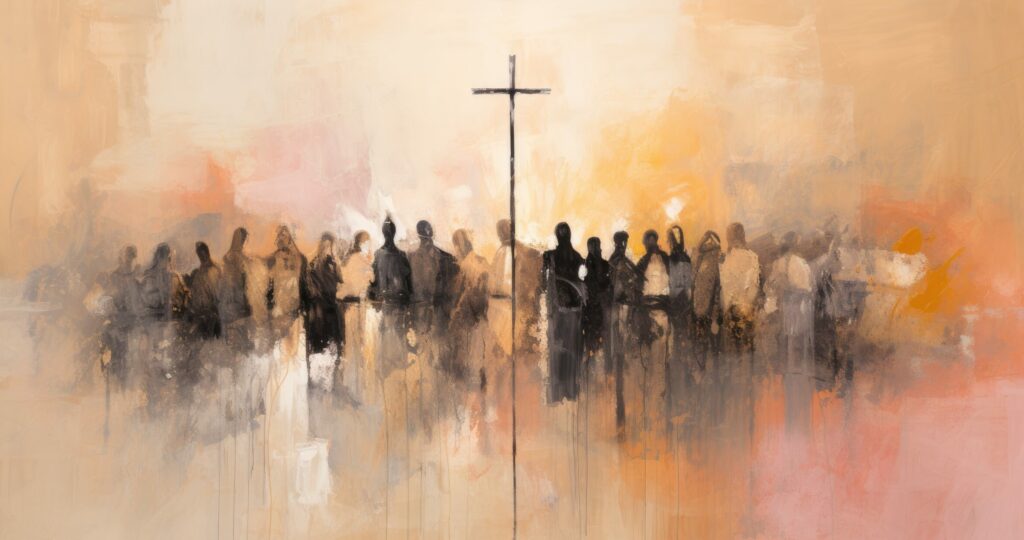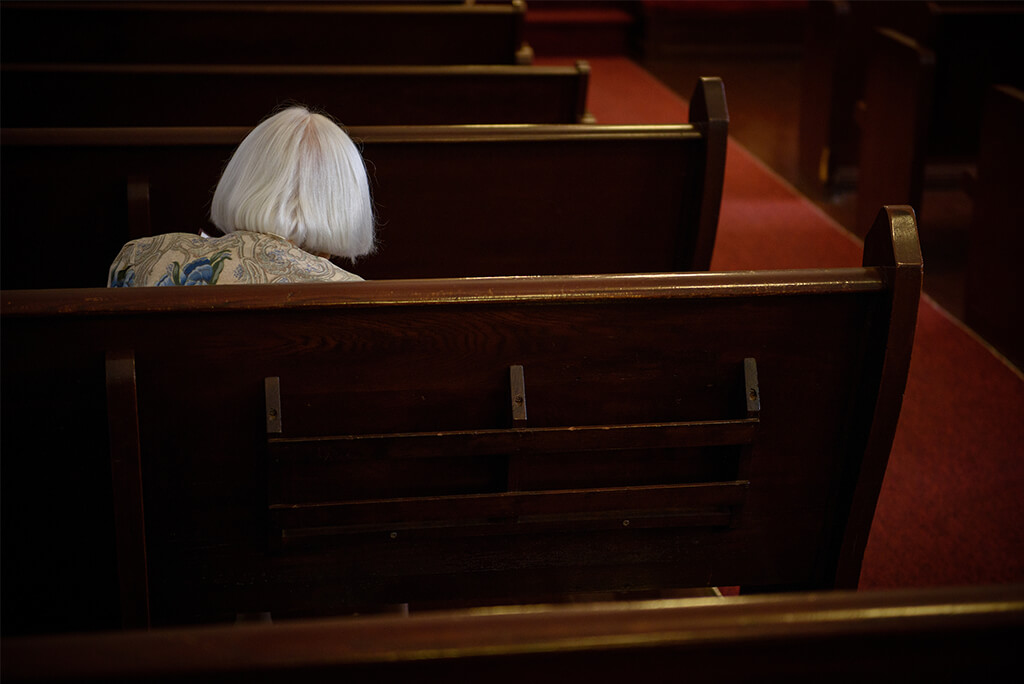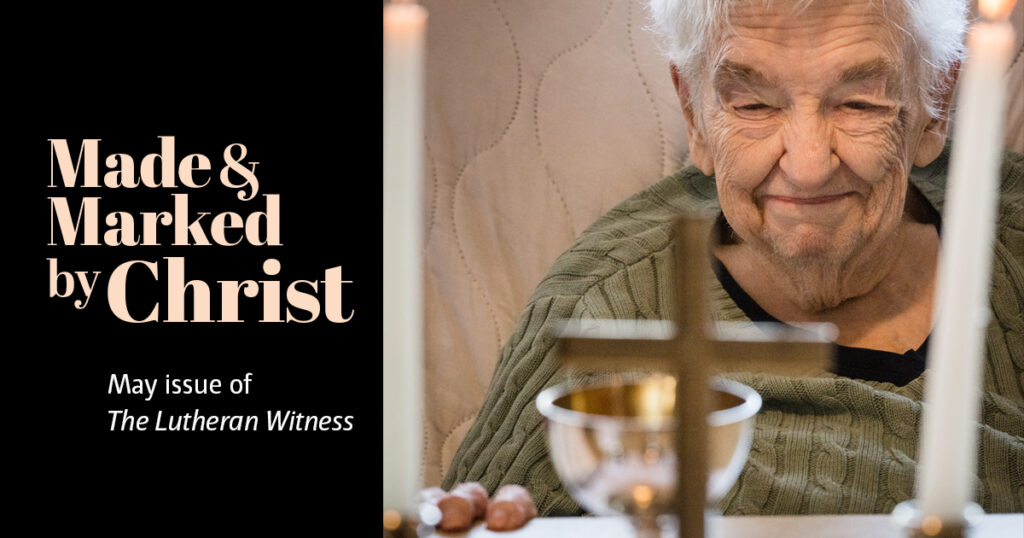By Adam Koontz
A sadness pervades the Christian church in our country. A sense of loss, vague and enormous and brooding, permeates our church life. Off in the distance, we seem to hear what sounds like the trumpet of retreat. While some of us run pell-mell in terror, others fall back by careful steps. All sense that the church’s high-water mark was somewhere in the past, and the future we face is dark and unsure.
We do not express our sadness openly because it seems cowardly to speak of gnawing worries about fewer pews filled on Sundays, fewer men willing to be pastors or fewer schools to teach the faith to the rising generation, fewer in number as those children themselves may be. What fills our speech when we do speak of closing churches or closing schools or whatever else the future may bring is that “quiet desperation” Henry David Thoreau, in his book Walden, thought was characteristic of the “mass of men.” What Thoreau imagined as a common human malady in every time is indeed common to our circuit meetings and church council sessions. Will we be able to get a pastor when our current pastor retires? Who knows? Will we be able to keep the school open in five years? No one can say. Will our church be around when my grandchildren are ready to be on the church council? It is anybody’s guess.
What we fear to say aloud or do not know, Jesus says boldly and truly knows. Our Lord does not leave us in quiet despair about Himself or His Bride, the church. The disciples who feared everything were the disciples Jesus visited with His peace on Easter evening (John 20:19–23). If you find despair to be a familiar companion or know someone in despair — whether it is your pastor or your friend or your teacher or your father — consider these things:
1) Christ is the Head of the church.
We cannot live our lives by our own sense of how things may go. Christ is alive. He had many apparently mighty foes, and He triumphed over them all, crushing death and Satan under His feet. At the head of every single Christian congregation is a living, triumphant Victor and King. To His voice we listen, and to Him we answer. His will is not that anyone in the United States of America should perish, but that all should repent and believe the Gospel of His death and resurrection for every sinner. If someone else had risen from the dead, if our doubts and fears had risen from the dead, then perhaps we should listen to them. But only He is the conqueror, so only His Word and His will have the say in our lives and in our churches.
2) The Head is our hope.
The more we focus on our uncertainties and fears, the more power they have over us. After Jesus’ resurrection, the disciples were still so afraid of the Jewish authorities, who had conspired with Pilate in Jesus’ death, that when they gathered, they locked the doors. Their locked doors expressed their closed-off sense of the church — worthwhile enough to gather the already-convinced, fearful enough to make any newcomers impossible. Since our hope for the future is laid entirely on the triune God, we need not succumb to fear. Christ’s peace is our present possession because the Lamb’s blood cleanses us from all our sins. We do not wish that things would be otherwise than they are. We know that God’s Son is working all things together for our good. The future is an unfolding of Christ’s plan and ends with His triumphant return, to which we look forward with love and hope.
3) Our Head has a bright future.
Despair is only possible between Good Friday’s darkness and Easter’s brilliant light. You can hear a familiar quiet despair in the reproaches the Emmaus disciples offer to the unknown Jesus who walks beside them: “But we had hoped he was the one to redeem Israel” (Luke 24:21). You can almost see the shrug of resignation in their shoulders and the sigh of despair on their lips. Remember that even the women’s Easter morning report of Jesus’ resurrection was not believed at that time (Luke 24:22–24; Mark 16:14) — too incredible, too wild, too hopeful, a piece of wishful thinking. Our quiet despair is always our forgetfulness of His resurrection and our refusal to see how it changes everything. Since death is behind Him, the whole future is open to Him. And His future is bright.
4) His bright future is ours too.
If Christ had not risen, then the disciples as a group at that time and your congregation as a group of Jesus’ disciples today would have no purpose. We could go the way of all purely human organizations: After their purpose has passed, they go the way of all flesh (Job 34:15). That would make sense if Christ were dead. Then we could throw up our hands in resignation and accept death ourselves. Since He is risen, we have not been joined to a body of death, destined to perish, bound to fade away. We were baptized into a death like His that we should all share in a resurrection like His. Christ’s church moves always from life to life, alive in Him now and headed for life everlasting.
5) Despair is not your master. Christ is your Lord.
Forget what lies behind, the steps your family or your congregation could have taken but did not. Put aside the bitterness of the past and the regrets that you did not see earlier or grasp sooner what would make for the Gospel’s growth in your home or in your town. Christ is not only Lord of the past, reigning over black-and-white photographs of large confirmation classes or happy baptismal parties in churches now closed. Christ is also Lord today and now and always.
Think of who in your area needs the hope He brings today. Ponder what would deepen your church’s knowledge of His peace right now. Act on what is always true: He is alive, and heaven is open to all believers in His promise. Our despair is rooted in our forgetfulness of His victorious life; our joy and hope are rooted in our remembrance of this conquering hero. After every enemy sought to destroy Him, He stepped forth from the grave, wounded on our behalf, crowned with life and victory. In Him, we more than conquer.

This article originally appeared in the March 2024 issue of The Lutheran Witness.






Me thinks that he who “despaireth” too intensely about the survival of God’s church in a hostile world needs to look to history. Perhaps, smaller in many respects, the church must be purged from time to time, and if it is stronger and leaner, it is actually healthier. In my community, and on the internet, I see healthy churches and bold Christians doing the Lord’s work. Many will not come to Jesus in a given place, but those who do, who are drawn and elect, are the warriors chosen to serve. We cannot expect that saved believers are only found in the Lutheran church. But if a denomination is suffering from very poor membership, it is an opportunity to examine the reasons with brutal honesty. Is a particular church doing the important things, or concerned about window dressing. Is preaching the Gospel the most important activity, along with Bible study, missions, community outreach? In my humble view, the essential things should be addressed, as a good start. Soli Deo Gloria
This reminds me of “UNCHRISTIAN” put out by Barna in early 2000’s that explained why the church, at that time, was declining with fewer and fewer young people. Today, people are looking for something meaningful that will not change. Something to fill the “hole in the soul” that even their children have and wanting to give them a rock to stand firmly upon, they are returning to churches in good numbers – contrary to so many negative articles. I’ve experienced it a churches I’ve visited and at churches I have and am currently serving. I’m pretty confident that the Spirit still works how and where He will.
To add to your words: From 2 Timothy 1:7, “For God has not given us a spirit of fear, but of power, and of love, and of a sound mind.” We must remember that missionaries have gone into hostile, violent and unreceptive lands and societies, faced hardships and persecutions, and often unimaginable martyrdoms, to serve the Lord, and bringing the Gospel. They had few resources, most were impoverished, held services in mud huts, complained little, and trusted God entirely.
Can we move away from the swamp of despair, and just trust Our Lord and strive to be faithful?
God is our refuge and strength,
a very present help in trouble.
Therefore we will not fear….
“Be still, and know that I am God.
I will be exalted among the nations,
I will be exalted in the earth!”
The Lord of hosts is with us;
the God of Jacob is our fortress.
— Ps. 46:1-2, 10-11 ESV
[T]he Father of mercies and God of all comfort …
comforts us in all our affliction,
so that we may be able to comfort
those who are in any affliction,
with the comfort with which we ourselves
are comforted by God.
— 2 Cor. 1:4 ESV
(I understand that the word comfort in the 2 Corinthians verse does not mean to soothe, as we use the word today, but to come alongside with real help. In that light, to comfort is to fortify.)
I heard Rev. Dr. Koontz speak about on this on KFUO radio, and I would like to encourage everyone to listen to his talk as well. I thank God for raising up faithful shepherds like Rev. Dr. Koontz and all of our pastors, who lead us and keep us in the means of grace, to the glory of Christ our Lord.
All this doom and gloom, where is your faith is what I want to shout as I read this! Yes, if you want to look at numbers, they are down but no one has 8 kids anymore, more like 1 or none but 3 dogs. It is a different world but not a different faith. Trinity Athens Wis is a great place to be! New faces all the time, the trumpets will be playing on Easter, church was full on Lutheran schools celebration. But so much more could be done~~reach out to friends and challenge them to come with, create a new happening and include those around you. Cutting/looping bags for homeless mats, gel penning a picture with a Bible verse with a few friends for a “gentle” Bible study, the list goes on.